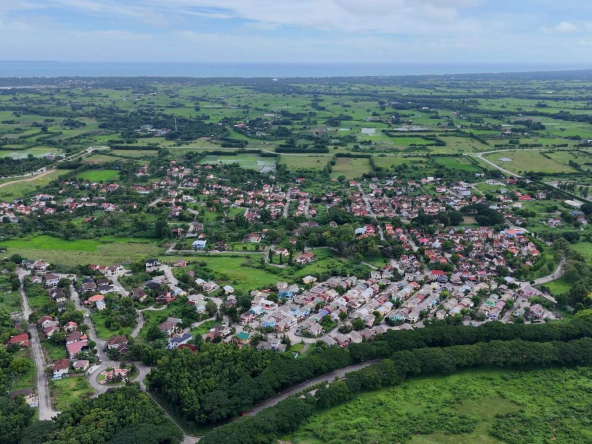
Image source: https://www.camella-cebu.com/properties/images/villages/camella-bogo/camella-bogo-amenity-001.jpg
A High-Growth Alternative to Metro Manila
Real estate investment in Cebu is drawing attention for its balanced mix of affordability, strong rental income, and capital appreciation.
With Cebu’s strategic location in Central Visayas and consistent infrastructure development, it offers an attractive destination for property investors seeking long-term gains.
Its natural beauty, growing population, and improved infrastructure make it a preferred location for property investment in Southeast Asia.
A large part of this confidence stems from Cebu’s balanced economic profile. Its urban core, Cebu City, is home to a mix of business districts, cultural institutions, and residential zones.
Meanwhile, neighbouring areas like Mandaue City and Lapu-Lapu City have developed distinct specialisations in manufacturing, logistics, and tourism that feed into the broader metro economy.
The consistent influx of domestic migrants and foreign nationals has intensified housing demand, turning real estate into a reliable generator of passive income.
Cebu’s Real Estate Market and Its Stable Demand
Cebu’s real estate market remains resilient, even during national downturns. Its diverse economy—driven by business process outsourcing (BPO), booming tourism industry, and manufacturing—supports consistent property values across Cebu City, Mandaue City, and Lapu-Lapu City.
Preferred Property Types for Buyers and Renters
Demand remains robust in both the residential and commercial sectors. Mid-rise condominiums, serviced apartments, and townhouse units are popular among young professionals and middle-income families, while high-end vertical developments cater to foreign investors and returning OFWs.
Retail and office spaces—particularly those in Cebu Business Park and the Cebu IT Park—are seeing high occupancy rates, driven by the expansion of business process outsourcing (BPO) and tech companies.
Economic Growth Fuels Steady Appreciation
Cebu’s thriving economy drives increasing demand for both residential and commercial properties. With economic zones managed by the Philippine Economic Zone Authority, foreign investors and BPOs continue to expand operations, pushing up demand in the local market.
Property Values and Infrastructure Projects
Infrastructure as a Value Catalyst
Property values in Cebu have consistently increased, particularly in areas near infrastructure projects such as the Cebu-Cordova Link Expressway (CCLEX) and Metro Cebu Expressway.
These new roads have significantly improved traffic flow, connecting suburban zones with commercial hubs and boosting the accessibility of previously overlooked neighbourhoods.
Connectivity to Business and Economic Zones
Developments that offer easy access to key business districts, economic zones, and transportation hubs are attracting both developers and buyers. Locations near the Mactan Cebu International Airport, for example, enjoy heightened demand from both tourists and international business professionals.
The improved connectivity not only supports daily commuting but also increases the appeal of rental properties and commercial establishments.
Rental Properties and Rental Income Opportunities
Tenant Profiles and Leasing Trends
The demand is largely fuelled by tenants who seek walkable neighbourhoods with access to workspaces, shopping centers, and transport terminals.
These include single professionals, young couples, and foreign nationals working in the IT or BPO industries. Fully furnished units and studio apartment options are especially preferred.
Short-term rentals thrive in coastal areas such as Mactan Island and Lapu-Lapu City, where the tourism industry continues to rebound. Tourists are drawn to Cebu’s natural beauty and urban sophistication, giving property investors the opportunity to generate passive income consistently.
High Growth Potential at Low Entry Cost
Pre-selling properties remain a favourite for first-time investors. These units offer lower acquisition costs and strong capital appreciation once completed. Most pre-selling developments are located in emerging districts close to infrastructure projects or expanding business hubs.
Buyers who secure units early often benefit from location-driven appreciation, especially once roads, transport links, or retail hubs are completed.
Investment Opportunities in Mandaue City and Beyond
Mandaue City has become a strategic hub for property investment in Cebu, offering strong demand, high rental yields, and relatively better value than Cebu City proper.
Known for its manufacturing and logistics base, Mandaue is home to industrial parks and key business districts that support sustained population growth and housing demand.
Camella Homes, for example, has strategically expanded in nearby growth areas such as Camella Riverdale in Talamban and Camella Bogo in Northern Cebu.
These master-planned communities provide affordable options for both end-users and property investors, with house-and-lot models like the Cara and Dani offering high capital appreciation potential.
Their proximity to major roads and commercial areas makes them appealing for long-term rentals or resale.
Beyond Mandaue, Minglanilla and Consolacion are also seeing increased investor activity. These municipalities have access to expanding transport routes, shopping centers, and proposed economic zones. Camella Cebu, for instance, caters to buyers looking for suburban ease with urban access.
Its community-centric amenities and transport connectivity make it attractive for young families and working professionals.
These emerging districts offer annual property appreciation rates estimated at 8–10 percent, especially for pre-selling units located near future infrastructure projects and lifestyle hubs.
As investor attention shifts beyond Cebu City’s core, these areas offer long-term value backed by population movement, developer confidence, and steady local market demand.
Shopping Centers and Lifestyle Hubs
Mixed-use developments integrate commercial, residential, and recreational spaces, creating a vibrant urban lifestyle that appeals to tenants and end-users alike. For investors, this translates to higher rental income and stronger tenant retention.
Properties within a short walking distance to retail districts—typically 10 to 15 minutes—tend to see vacancy rates drop below 5 percent and command rental premiums of up to 15 percent compared to their more isolated counterparts.
Modern renters, particularly young professionals in the business process outsourcing (BPO) and information technology sectors, prioritise convenience.
They favour locations that offer seamless access to shopping centers, office spaces, and transport terminals—making such areas highly competitive within the local market.
Real Estate Investors Targeting Commercial Properties
Cebu’s commercial property segment continues to evolve in response to the demands of a fast-changing economy. With over 200 BPO firms now operating across Metro Cebu, the need for office spaces near central business districts remains high.
Cebu Business Park and Cebu IT Park remain top choices, but fringe locations like Banilad and Apas are emerging as viable alternatives due to their improving infrastructure and lower rental rates.
Recent data from Leechiu Property Consultants places Cebu’s office vacancy rate at 7.5 percent—well below the national average. Demand is shifting toward flexible-use commercial properties, including coworking spaces, training centers, and hybrid offices that can accommodate remote teams.
These trends are creating new investment opportunities for those who want to diversify beyond residential units.
Investors targeting commercial properties near PEZA-accredited economic zones or planned township developments, such as those in South Road Properties (SRP), benefit from tenant stability, longer lease terms, and potential tax incentives. Proximity to major arteries, business parks, and transport hubs remains critical for capital appreciation and consistent rental yields.
Conclusion
Cebu offers a rare blend of urban sophistication and natural beauty. From vibrant business hubs to coastal resorts, the city boasts a lifestyle-driven property market ideal for both investors and end-users. With strong economic growth, increasing demand, and prime location advantages, Cebu continues to offer exceptional opportunity for real estate investors.
Always conduct thorough due diligence before purchasing Cebu properties. Consider developer reputation, documentary stamp tax costs, legal clearances, and zoning laws to safeguard your investment goals.
Whether you’re targeting short-term rentals, long-term rental income, or capital gains, real estate investment in Cebu market presents a stable and rewarding environment for every type of property investor.


